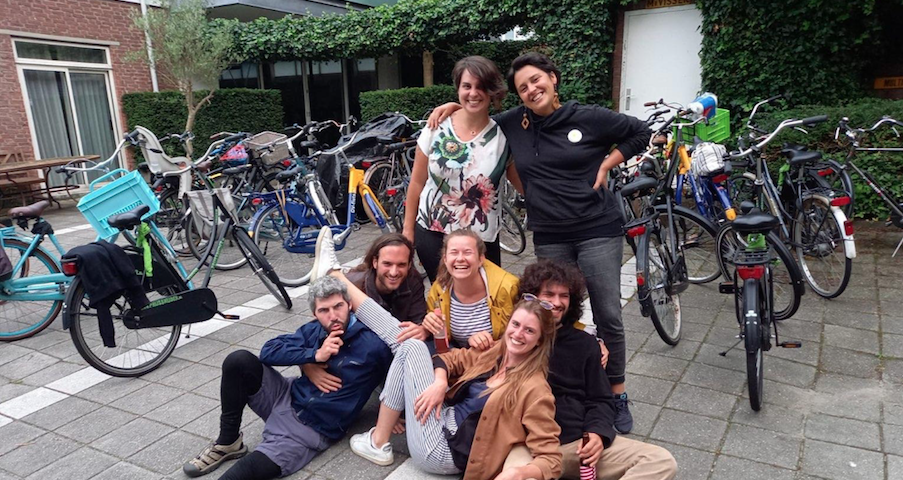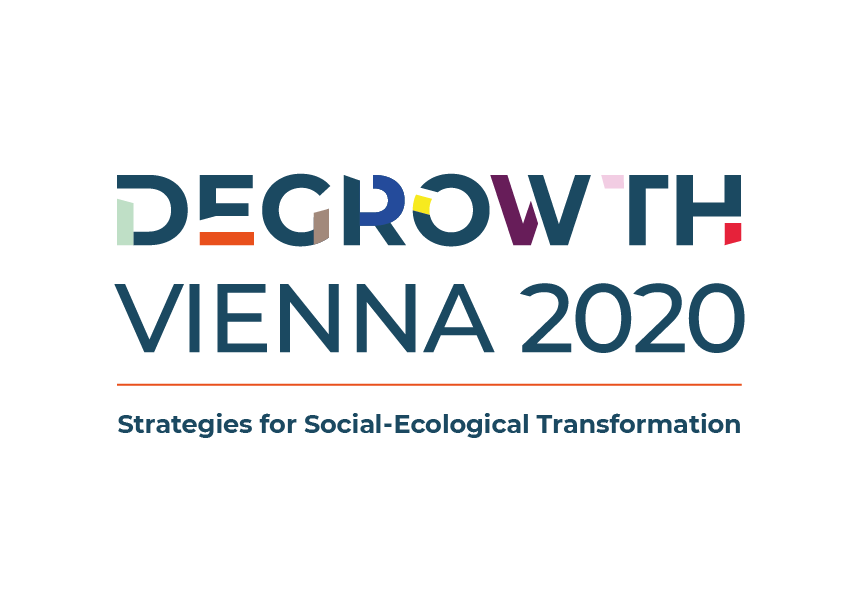The conference “Degrowth Vienna 2020: Strategies for Socio-ecological transformation” took place online between May and June 2020, in the midst of a pandemic crisis. This two-part piece will firstly reflect upon the conference (part I) and then propose ways to move forward (part II). As a member of the Advisory Board, I was partly involved in the discussions regarding the planning of the conference, while the great bulk of the laborious, ingenious organizational work was undertaken by the organizing team. The Vienna degrowth conference was the first digital degrowth conference ever undertaken, and I think it was a successful and needed experiment. First, I think this was a needed experiment because despite all the limits of online conferences (for instance, loss of conviviality and of more-in depth debate), I think that individual online participation should be contemplated as one possible option in future degrowth conferences, because it allows to avoid environmentally damaging travel. There was also the need to have a discussion on the current pandemic reconfiguration of the multiple crises. In addition, a discussion on the topic of strategies for a degrowth transformation was long overdue. This was very clear for those of us who attended the 6th International degrowth conference in Malmö, where some heated debate sparked off in one of the final plenary discussions exactly over disagreements around the topic of the strategy of seizing state power to bring about a degrowth transformation. I think this was a successful conference because it managed to deepen the discussion on strategies, with a range of diversified and on average high quality sessions, and it accomplished this in a meaningful way by involving activists, civil society representatives, and other social movements and not simply academics –more than in previous degrowth conferences. More particularly, rather than separating the academic from the activist sessions as in previous conferences, in most of the sessions it built an engaged dialogue between these two types of profiles, thus enriching discussions. This allowed us to confront us with concrete struggles and realities and in some cases and to understand how to build some ground for potential alliances. The Vienna conference testifies that the degrowth movement and debate is making a further step. Up to now it has mostly been focusing on the everyday level and on so-called nowutopias and ”interstitial transformations”. Borrowing from Erik Olin Wright, this concept has been discussed at the “Strategic Approaches” plenary session, and refers to all the grassroots localised alternatives building new forms of social empowerment in capitalist society’s niches and margins. Recently degrowth researchers have started to reflect on other types of transformations, which E.O. called symbiotic transformations, that is those non-reformist or radical reforms that aim to substantially modify power relations by weakening the capitalist system and by deepening institutional forms of social empowerment. Some interesting discussions have taken place with regards to policies at the national level (for example on basic income, and on rethinking ownership in production, in the session “Via radical social reforms towards a counter-hegemony?”), international level (for ex by addressing trade agreements, which blatantly conflict with environmental goals, as Olivier de Schutter reminded us for the food sector, or by engaging with the Green New Deal for Europe initiative), but also at the regional and local level. Here some degrowth innovative policies are indeed already taking place – we could hear for example the interesting story of Mals in South Tyrol by Armin Bernhard, where citizens managed to impose organic agriculture at the municipal level through a referendum. However, these local policies are often not being supported by national policies, but are rather being fought at different levels of governance and law-making. These power struggles are linked to the state question, a topic that the degrowth movement is just starting to tackle, at the Vienna conference and in recent publications (see for example the recent article by D´Alisa and Kallis) - I will come back to this other question later. Furthermore, several panelists such as Ulrich Brand and Matthias Schmeltzer in the opening plenary and in the Saturday morning panel pointed out that we should not idealise degrowth by design conceiving it as a smooth transition, but we should understand that crises such as the current one are the likely scenario in which degrowth will have to insert itself through complicated struggles and alliances. This cannot happen without engaging with the state. The conference showed that bridging with diverse movements is essential in order to build or strengthen alliances – for Vienna, this bridging materialised with trade unions and with environmental justice movements in the global South. This is important in order to avoid superficial readings of degrowth but also to understand how can we better frame degrowth in a way that it integrates and accommodates potential allies’ concerns when/if they are compatible with the degrowth vision. Here I am thinking of the interesting debate sparked in the session “The historic role of trade unions” around the statement of Florian Wenninger (from the Austrian chamber of Labour) who perceives degrowth as a middle class phenomenon, not attentive to redistributional issue. Voices from people that are potentially compatible with degrowth, although in a critical way, are also very helpful, as we need to be self-critical about our own strategies. In the second part of this two-part series I will discuss how the degrowth can move forward best on the inputs and insights from the Vienna conference. Stay tuned for part 2, on moving forward, published next week. This piece is based on the text of my own contribution to the closing plenary of the Degrowth Vienna conference. I thank the conference organizers for inviting me, and the moderator and other participants of the session: Christian Kerschner, Nina Treu, Tonny Nowshin, and Halliki Kreinin. I also thank Nathan Barlow and the degrowth.info team for having invited me to contribute to this blog.

In 2024, Degrowth.info celebrates its 10th anniversary. We give you some insights into our collective: from our horizontal structure and our involvement in the degrowth movement to our team's political friendship and laughter.

This summer, the 8th International Degrowth conference took place in Den Haag. This summary provides a peek at some of the important themes, take-aways, and points of contention discussed in the conference reportage co-published by the organisers Transnational Institute and Ontgroei.

COVID-19 has had many effects. Among others, it created a pause, putting non-essential economic activity on halt. A pause that has exposed the numerous weaknesses of growth-centred, globalised economies. A pause that created space for a range of suggestions, a tasting of alternative futures from different parts of the political spectrum, including nationalism, surveillance and austerity ...